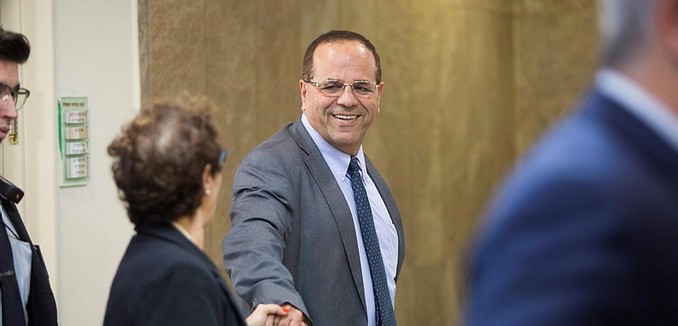“Israel receives more international legitimacy today than it has since independence,” Israel’s chief envoy to the Arab world, a Druze deputy minister in the governing coalition, said in a profile published Monday in Tablet.
Ayoob Kara, a Druze member of the Likud and Israel’s Deputy Minister of Regional Cooperation, added that “our relations with our neighbors are the best they’ve ever been.”
These assertions are not idle boasts, wrote Elhanan Miller:
Last November, Israel quietly opened its first diplomatic office in Abu Dhabi, the capital of the United Arab Emirates, inside the headquarters of the United Nations’ International Renewable Energy Agency. In July, Israeli diplomats had hardly caught their breath from the visit of Egyptian Foreign Minister Sameh Shoukry, the first in nine years, before receiving a high-ranking Saudi delegation headed by retired general Anwar Ishqi. Having now signed a reconciliation deal with Turkey, Israel is experiencing a diplomatic renaissance with almost all of its regional neighbors.
“Once, [Arab politicians] used to run away from me when they heard I’m Israeli,” Kara told Miller, but now “we are praised by ministers and parliament members from places like Iraq, Saudi Arabia, and Morocco.” Kara tempered his statement by noting that much of the praise is quiet due to what he called their “culture of hypocrisy.”
He attributes the lack of openness in Israel’s dealings with the Arab world to Washington’s recent coolness toward Jerusalem. “With the Americans of earlier days, Netanyahu would have already visited a number of Gulf states,” Kara claimed. “They [the Arab leaders] admire him and like him so much. I’ve heard this from at least six or seven leaders in the Arab world.”
The deputy minister was also critical of the United States’ insistence that Israel engage the Palestinians in diplomacy. “We have no partner, and there is no chance of progress on [peace],” he said. The Palestinians “are even talking about canceling the Balfour Declaration [sic], so who exactly am I waiting for?”
Kara comes from a family with a long history of service to Israel. His grandfather Salman worked for Keren Hayesod, the organization in charge of acquiring land for the Jewish state. Salman move his family to Caesarea around 1948 by invitation of president Chaim Weizman’s family. Salman was wounded in Israel’s War of Independence, and two of Salman’s sons were killed by Arab nationalists because they worked closely with Jews.
In more recent times, Ayoob Kara lost two brothers fighting on the Lebanese border. Ayoob himself was injured as a young officer fighting in the First Lebanon War in the early 1980s. He was invited to join the Likud party by future prime minister Yitzchak Shamir, an acquaintance of Salman.
Kara refrains from identifying as a Druze while engaging in domestic politics, saying, ““I am Israeli, period.” But when speaking with Arab counterparts, he doesn’t hesitate to mention that he is a member of a minority community in Israel. “What better example can they have for the equality between Jews and non-Jews in Israel?” he pointed out.
Like Israeli Prime Minister Benjamin Netanyahu, the leader of his party, Kara is convinced that peace is more likely to come via economic progress, not signed documents. Kara is working on building economic ties with Jordan; Israel has already approved permits in the resort city of Eilat for 1,500 Jordanian day laborers, who will receive an Israeli minimum wage payment that is four times what they would be paid in Jordan. Israel plans to open a border crossing south of the Dead Sea to give Jordanians the opportunity to work in the area’s resorts and mineral plants.
“There are currently 4,000 jobs in Dead Sea hotels and Arava agriculture taken by foreign workers,” Kara pointed out. “Why shouldn’t Jordanians come in? It strengthens their economy and thereby their security. It stops fanaticism.”
Kara is also looking to boost Israeli economic cooperation with Saudi Arabia, which he sees as a key ally in fighting Iranian aggression. Israel has resources, such as water and natural gas, that Saudi Arabia needs. He even envisions the possibility of signing a regional defense pact with all eight members of the Gulf Cooperation Council.
“Iran should know that if it attacks, it will face a unified coalition and may be wiped out,” Kara stated. “Such a coalition is entirely possible. If the Americans lend us a hand it will work for sure, but even if they don’t—reality will bring it about.”
Israel’s diplomacy outreach has brought it new friends and coalitions around the world in recent months, particularly in Africa Netanyahu is scheduled to attend a summit of the Economic Community of West African States in Nigeria later this year. Netanyahu visited Uganda, Kenya, Rwanda, and Ethiopia on a historic tour of East Africa in July. Weeks later, the Republic of Guinea, a Muslim-majority African nation, restored diplomatic ties with Israel after a 49-year break. Netanyahu has made it a priority to strengthen Israel’s commercial, diplomatic, and security relations with African countries. Israel has a long history of sharing its expertise on the continent and Jerusalem hopes that increased ties with African nations will lead to a shift in their voting trends at the UN and other global fora, thus improving Israel’s diplomatic standing and reversing what Netanyahu called “the automatic majority against Israel.”
[Photo: Yonatan Sindel / Flash90 ]




